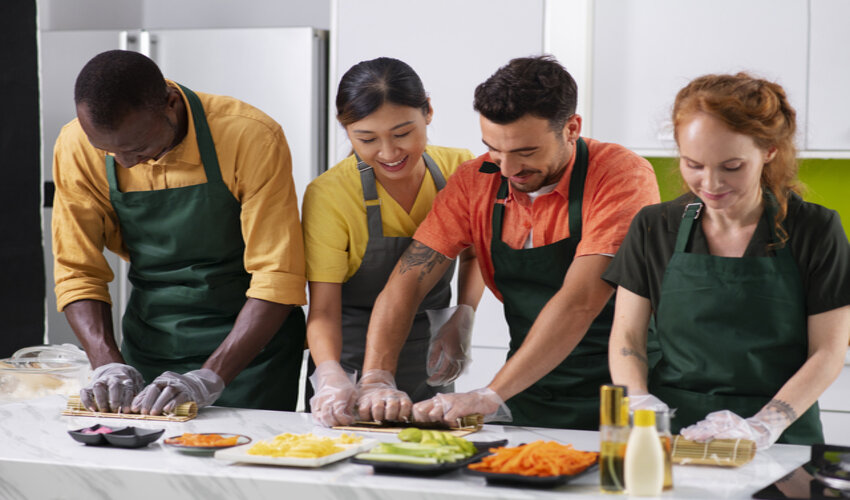Commercial cookery is a professional and regulated field of cooking that involves food preparation for commercial or business purposes. Commercial cooking courses help one develop the skills related to preparing, cooking, and presenting food in a commercial setting, such as restaurants, cafes, hotels, and catering companies.
Individuals who aspire to work in the field of commercial cookery must mandatorily undergo a practical training that equips them with the necessary skills and knowledge to work in a professional kitchen environment.
Why Do Commercial Cooks Require Practical Training?
Practical training is essential in shaping future chefs and culinary experts in culinary arts. Precision, innovation, and efficiency are critical to achieving success in the field of commercial cooking. Practical training involves providing one with hands-on training in kitchen settings to help them work efficiently in real-life scenarios. We will now understand why practical training is important for commercial cooking and how it benefits both people and the culinary industry.
Advantages of Practical Training in Commercial Cookery
Given below are some advantages of offering practical training in commercial cookery courses in Australia.
Practical Experience
The gain of hands-on experience is one of the most convincing reasons why practical training is essential for commercial cooking. The kitchen is a dynamic and fast-paced setting in which theoretical knowledge alone is insufficient. Practical instruction exposes budding chefs to real food, equipment, and time constraints. This experience is crucial because it exposes students to the rigours of a professional kitchen while also teaching them the skills of multitasking, time management, and adaptability.
These practical training programs in commercial cooking courses give students real-world kitchen experience, preparing them for the demands of the culinary business.
Development of Skills
Commercial cooking is an art that necessitates a wide range of abilities, from knife skills to flavour combinations and plating aesthetics. Practical training allows students to hone and master these skills. Individuals can improve their culinary skills and understand the intricacies of various cuisines with the help of skilled instructors. One can pursue a commercial cookery course in Adelaide that will offer them practical training in a real-time kitchen setting so they can take their career forward.
Exposure to culinary facilities allows students to practice their skills in a professional setting, ensuring they are well-equipped to meet the industry’s high requirements.
Innovation and Creativity
Practical training not only teaches basic skills but also fosters creativity and innovation. The culinary world is always changing, with new trends and fusions developing on a regular basis. Practical training allows future cooks to experiment with different ingredients and techniques, which fosters creativity and allows them to establish their own culinary identities. Pursuing a commercial cookery course in Perth will encourage creativity, allowing students to express their culinary vision while maintaining a firm basis in conventional skills.
Collaboration and communication
Commercial kitchens are often hives of activity, and a team of chefs must collaborate smoothly to ensure a smooth service. In the kitchen, practical training instills the value of teamwork and good communication. It teaches students how to collaborate with coworkers, assign duties, and keep a positive work atmosphere.
Practical training offered in courses for chef stresses the collaborative side of commercial cooking, assisting students in becoming team players who can flourish in a high-pressure kitchen setting.
Problem-Solving and Adaptability
Not everything goes as planned in the culinary world. Ingredients may run out, equipment may fail, and clients may have particular dietary needs. Practical training provided across the best colleges in Australia prepares students to adapt to unanticipated difficulties and solve problems on the fly. It teaches them to think on their feet and come up with solutions that keep the food and service quality high.
Practical training programs in Australia expose students to real-world problems, preparing them to deal with the volatility of a commercial kitchen with confidence and poise.
Ingredients Explained
A thorough understanding of components is essential in commercial cooking. Practical instruction allows students to work with various ingredients, allowing them to learn about their flavours, textures, and applications. This understanding is essential for generating well-balanced and tasty foods.
Practical training offered in cookery courses in Adelaide for international students ensures that students have a thorough understanding of ingredients, allowing them to make informed decisions and create recipes that thrill the palate.
Exposure to the Industry
Internships and placements in professional kitchens are common components of practical training. This industry exposure is priceless for prospective chefs because it helps them to network, observe seasoned chefs, and get insights into the inner workings of established restaurants and catering firms. It also allows students to display their skills and maybe land job chances. Practical training programs provide students with industry exposure by connecting them with some of the greatest restaurants in the country.
Commercial Cooking Courses in Australia:
If you are looking to study in Australia and want to pursue a career in commercial cookery, you can either opt for a Diploma of Hospitality Management or pursue a Certificate IV in Kitchen Management. A Diploma in hospitality management will help you gain the necessary expertise and skills to manage the day-to-day operations in the hospitality sector effectively. Pursuing a Certificate IV in Kitchen Management course will help you start your career as a professional chef/supervisor in commercial kitchen settings. Both these courses offer practical training to the students to train them to apply their learnings and skills in commercial settings.
Conclusion
Practical training is not only advantageous but also a mandatory requirement for commercial cooking. It provides prospective cooks with the opportunity to gain hands-on experience, cultivate creativity, and prepare for the demands of a dynamic and demanding field. Providing practical training guarantees that students are well-prepared to flourish in the culinary sector and develop as top-tier culinary experts. So, enroll yourself for a cookery course in Australia that pursue the chance to learn, grow, and flourish in a kitchen where your passion and abilities may shine.
Author Bio:
Alex Parr, a well-known author, delves into the dynamic world of best colleges in Australia, capturing the spirit of higher education. Alex’s incisive essays examine the distinctive culture, diversified college courses, and transforming experiences that define tertiary education in Australia with a sharp eye for detail and a passion for academics. His works are an invaluable resource for students and aficionados navigating the academic terrain in the country of kangaroos and koalas.














Leave a Reply